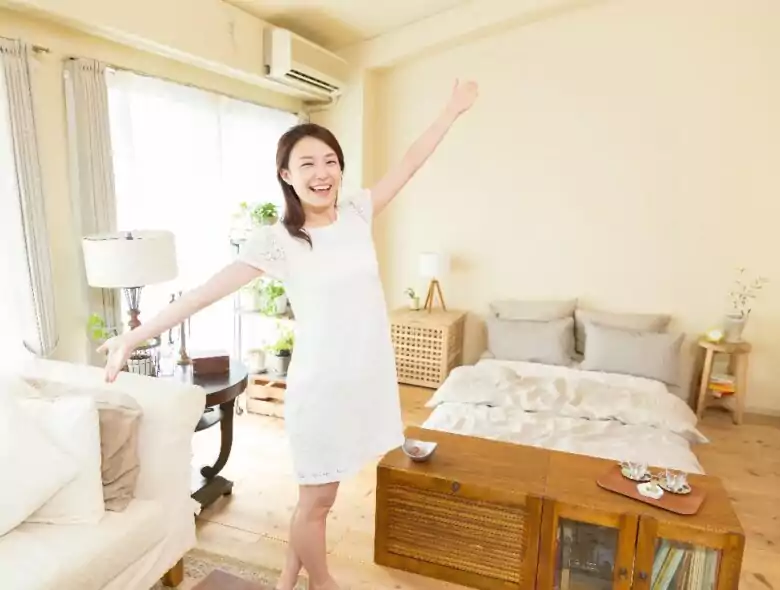A 2021 Japanese government study revealed that over 3 million single men and women between the ages of 35 and 44 still lived with their parents as reported by The Japan Times. In particular, men are more likely than women to remain at home, though there is a growing trend of single men being encouraged to move out after the age of 35.
Unlike in many Western countries, the majority of Asian countries don’t share the custom of having kids move out once they turn 18; and it is considered normal and sometimes even expected to keep living with your parents until you get married. Despite the West having this rite of passage of leaving home once a child turns 18, the reality is that given the current economic and housing climate, this expectation has become increasingly unrealistic and financially unfeasible.
So, when is the best time to move out of your parents’ home? There is no one-answer-fits-all response to this as each individual comes with their own set of situations and factors that can determine the time.
Best Timing to Move Out
Moving out of your parent’s home is dependent on numerous factors, some of which include:
- Cultural norms and traditions
- Job-status
- Relationship with parents
- Marital status
- Financial means
As previously mentioned, it was considered normal for many children in Western countries to leave the nest upon turning 18 when they were expected to go off to college. However, given the current economic climate and the world still recovering from COVID-19, there has been an uptick of kids either delaying moving out to live on their own, or even moving back in with their parents.
A global study showed that 48.9% of individuals between the ages of 18-34 in Japan still lived with their parents and one of the biggest contributors to this statistic is that there is less pressure and expectation to move out from Japanese parents.
Moving out to live on your own is not something to be taken lightly and is a highly personal decision. Reasons why people may choose to move out of their parent’s home may include;
- Having to move for work
- The commute from their parent’s home to their workplace is too long
- They aren’t on good terms with their parents
- They are in a long-term, committed relationship
- They desire space, privacy, and autonomy
Nowadays, the general rule of thumb is that the best time to move out is between the ages of 24 and 27, under the assumption that by the time you are in this age bracket, you would have graduated from college or university, gotten a job, and are possibly in a long-term relationship. Of course, this does not apply to every single individual and thus, when someone decides to move out of their parents’ home can differ depending on their situations and circumstances.
Advantages of Living with Parents

As with many things in life, there are pros and cons to living with your parents. Some benefits to remaining at home include:
- Not having to pay rent or only having to contribute to household expenses such as financially helping out with groceries and utilities
- Not having to look for an apartment that meets your needs and requirements
- Being familiar with the area and neighborhood and knowing it’s safe
- Having a support system should you need help and assistance
- Companionship
- Being able to save money for the future
- Having people to split household chores, maintenance, and upkeep of the house or apartment
On the other hand, some disadvantages of living with your parents include:
- Lack of privacy, space, and autonomy, especially in Japan where houses and apartments tend to be smaller
- Harder to spend quality time and work on your relationships with friends and romantic partners, especially if your parents aren’t keen on you bringing someone home
- Inevitable tension and arguments that may arise from constantly living in close quarters with your parents (parents still treating you like a child, your schedules, habits, and routines clashing, etc.)
- Fewer opportunities to learn crucial life lessons and develop a sense of self-reliance and autonomy
Advantages of Living Alone

Those who are thinking of moving out and living alone should also weigh the following pros and cons before taking this next big step.
Benefits:
- Privacy and personal space are guaranteed
- Lots of opportunities for personal development and growth (learning crucial life skills, how to solve issues on your own, how to build confidence and self-reliance)
- Cleanliness on your terms
- Visitors when and how often do you want
- Being able to decorate and arrange furniture to your specific needs and tastes
- May improve your relationship with your family because there are fewer opportunities for friction and tension if you’re not constantly in the same space as them
Drawbacks:
- May feel lonely, anxious, and bored, especially for those living alone for the first time
- Household chores, maintenance, and upkeep of the property are solely your responsibility
- Financially taxing – you have to pay rent, bills, repairs, etc.
- Support systems may not be as easily accessible, especially if you decide to or have to live a good distance away from your family
Living Alone for the First Time

Choosing to live alone can be a confusing, anxiety-filled, and nerve-wracking experience but you can minimize the stress of moving out of your parents’ home by considering all the factors and being prepared and organized.
One of the biggest things to tackle is your budget and finances. Living alone will be more costly as you will be responsible for paying for everything – rent, bills, maintenance, food, etc. Living alone is considered by many to be a financial privilege so be sure that you are financially able to support yourself if you want to live alone. When it comes to buying household essentials and groceries, shop smart – keep an eye out for sales and discounts at your local supermarket, make use of one of the numerous 100-yen stores scattered throughout Japan, and buy essentials in bulk when they go on sale. One of the benefits of living alone is that you can stock up on your essential and favorite products and store them at home as you have the space to do so.
Building up habits and routines that cater to and suit your lifestyle and schedule can help create a sense of comfort and safety. Humans are, by nature, habitual beings, and establishing habits and routines will benefit your physiological, emotional, and mental health.
Living alone does not mean you have to isolate yourself or always rely on yourself. It’s important to ask for help when you need it and to continue to stay connected to and to foster and develop the connections you have with family and friends.
Take the opportunity during the first few weeks of living alone to explore your neighborhood and introduce yourself to your neighbors. Familiarizing yourself with the local area and building some kind of relationship with your neighbors can help provide you with a safety net should you require assistance in an emergency.
How Much Money Is Needed to Live Alone?

One of the most concerning things when someone decides to live alone is cost. Everything from rent to bills to groceries have to be paid out of their pocket so it’s important to weigh your current salary against the living costs of the prefecture, city, or ward you want to move to.
According to Statista, the average monthly salaries for working men and women as of 2022 differ depending on their education status.
Men who graduated from a junior college earned an average of ¥348,000 monthly while women earned an average of ¥269,000 monthly.
Men who graduated from university earned around ¥392,000 monthly while women earned around ¥294,000 monthly.
Men with post-graduate degrees could earn up to ¥478,000 per month while women with post-graduate degrees could earn around ¥404,000 per month.
When it comes to rent, the Japanese nationwide monthly average rent for a one-room apartment (20m²~ 40m²), excluding utilities can fall anywhere between ¥50,000 to ¥70,000. Of course, this average increases if you decide to live in big cities such as Central Tokyo, where rent can start at an eye-watering ¥100,000. If you are looking to move out of your parents’ home but are on a bit of a strict budget, then Village House may prove helpful to you as they specialize in rental properties that start at ¥20,000 in rent and have low up-front costs.
Utilities – power, water, gas – will depend on each individual and whether or not it’s summer or winter; but it’s estimated that the average person in Japan pays around ¥12,000 in utilities per month (around ¥6,500 for electricity; ¥3,000 for gas; ¥2,500 for water).
Cell phone plans in Japan tend to err on the pricier side though there are now plans and contracts that cater to those on a budget. In general, though, a monthly cell phone plan in Japan can run you anywhere between ¥2,500 to ¥7,500.
For home internet, depending on what service you go with, the bills usually start from around ¥4,500.
Lastly, a monthly transport pass in Japan can start from around ¥6,600 but luckily, this is usually subsidized by the company you work for; and if you work from home, you eliminate this expense.
In sum, it’s estimated that the average single individual in Japan needs around ¥298,096 to live on per month. Of course, this is a simple guesstimate as your overall expenses will depend on how much rent you need to pay, how much your monthly bills are, and what kind of lifestyle you need.
Related articles:
- Living Alone as a College Student – The Most Common Problems and How to Deal with Them
- Living Costs for College Students Living Alone: Tips for Saving Money!
- A Student’s Guide to Apartment Hunting
- The Quintessential Moving Day Guide
- Moving by Yourself: Is It a Good Idea?



